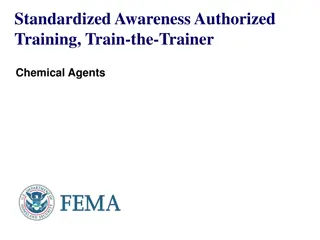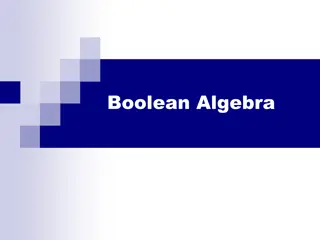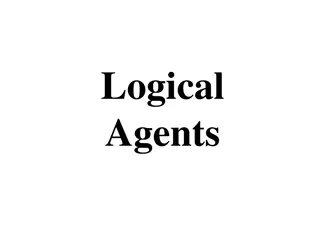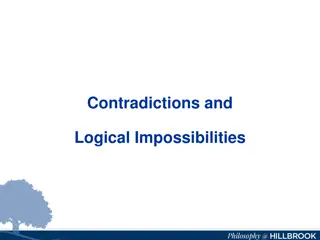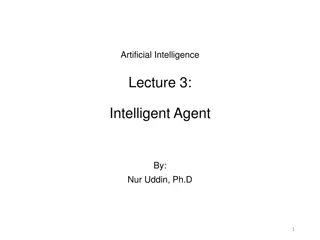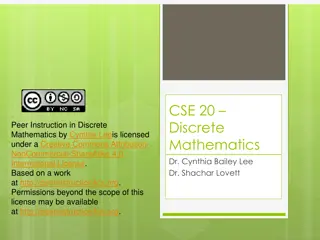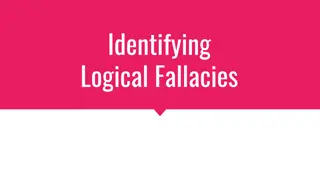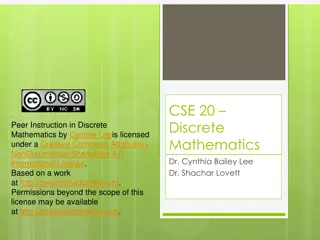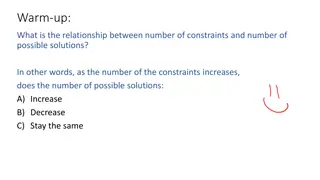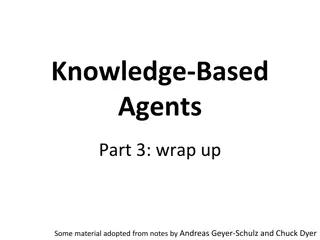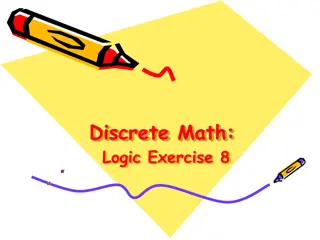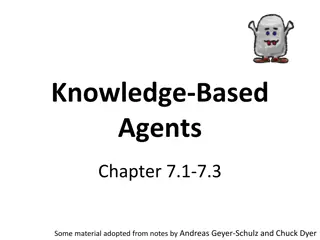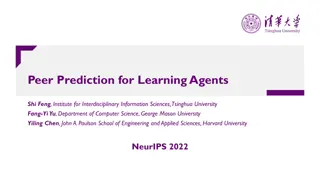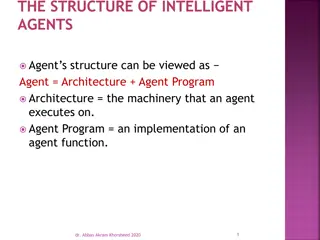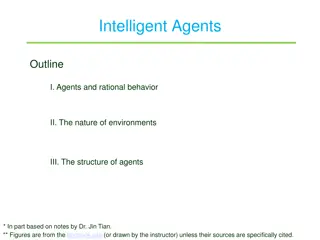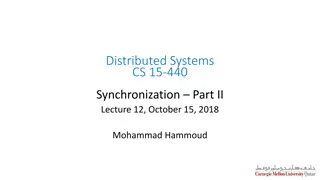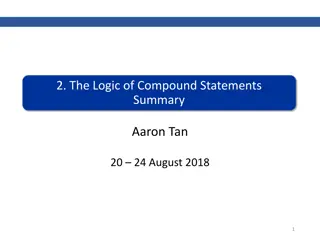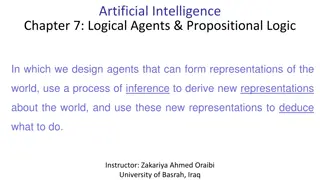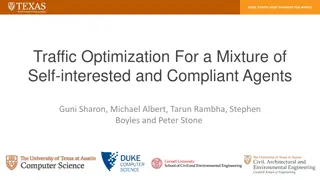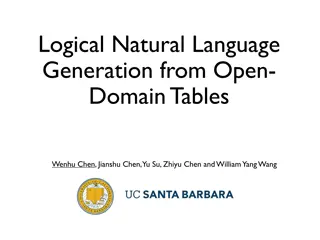Understanding Logical Form and Equivalence in Conditional Statements
Delve into the intricacies of logical form, equivalence, and compound statements in the realm of propositional logic. Explore valid and invalid arguments, conditional statements, and the logic of compound statements with puzzles to sharpen your logical reasoning skills. Unravel scenarios like determ
2 views • 81 slides
Chemical Agents Awareness Training Overview
This training module covers standardized awareness and authorized training on chemical agents, including toxic industrial chemicals, riot control agents, and chemical warfare agents. Participants will learn about the physiological signs/symptoms, advantages/disadvantages of using chemical agents for
1 views • 20 slides
Logical Expressions and Symbolism in Sentential Logic
Understanding sentential logic, logical expressions, and symbols through examples of logical reasoning and inference. Explore the concepts of logical OR, AND, negation, and the complexities of inclusive and exclusive logic in various scenarios.
1 views • 33 slides
Understanding Boolean Algebra and Logical Statements
Introduction to Boolean algebra, logical statements, and compound statements. Explore the concepts of Boolean variables, logical operators, writing conventions, equivalence in Boolean algebra, and truth tables. Learn how to analyze and evaluate logical expressions using truth tables.
1 views • 25 slides
Exploring Logical Agents and Architectures in Wumpus World
Explore the use of logical agents in the Wumpus World domain through three agent architectures: reflex agents, model-based agents, and goal-based agents. Understand how these agents operate in the challenging environment of the Wumpus World, where the task is to find the gold, return to starting pos
0 views • 21 slides
Exploring Contradictions and Logical Impossibilities
Explore a series of paradoxes and logical puzzles, ranging from being in two places at once to time travel conundrums. Discover the concept of contradictions and logical impossibilities through thought-provoking scenarios and riddles. Dive into the realm of impossibilities and challenge your underst
1 views • 6 slides
Selection and Appointment of Foreign Sales Agents: A Comprehensive Guide
Learn about the process of selecting and appointing foreign sales agents in international marketing, including the meaning of agency, content of foreign sales agency contracts, reasons for appointing agents, factors influencing agent selection, as well as the advantages and disadvantages of working
1 views • 12 slides
Enhancing Logical Reasoning in Decision Making Process
Federal Criterion #28 emphasizes the importance of stating logical reasons for decisions that align with findings of fact and conclusions of law. This criterion is key to ensuring fairness and accuracy in legal analysis. The scoring criteria, national appeals review results, and ways to improve scor
1 views • 8 slides
Understanding Intelligent Agents in Artificial Intelligence
Intelligent agents in artificial intelligence act rationally to achieve the best outcomes in various environments. They operate autonomously, perceive their surroundings, adapt to changes, and pursue goals efficiently. Developing intelligent agents involves examining agents, environments, and their
1 views • 22 slides
Understanding Antineoplastic Agents in Pharmaceutical Chemistry
Antineoplastic agents, such as alkylating agents, target DNA or DNA replication to induce apoptosis in cancer cells. Alkylation of DNA can lead to cell death through various mechanisms, including p53 activation. Resistance to alkylating agents can develop in cancer cells. The process involves nucleo
1 views • 94 slides
Understanding Adjuvants and Herbicide Formulation
Adjuvants are additives that enhance herbicide effectiveness, crucial for optimal weed control. Types include surfactants, stabilizing agents, coupling agents, humectants, deposit builders, and more. Surfactants aid in wetting and spreading herbicides, stabilizing agents keep suspensions intact, cou
0 views • 10 slides
Understanding Boolean Algebra and Logical Statements
Boolean Algebra allows for formalizing logical reasoning using variables that can be either true or false. It involves logical statements, compound expressions, logical operators like AND, OR, NOT, writing conventions, equivalence, and truth tables to determine the truth values of statements. By und
0 views • 25 slides
Understanding the Impact of the Tenants Fee Ban on Landlords and Agents
The Tenants Fees Act bans all fees from letting agents and landlords to tenants, impacting the rental market significantly. This article explores what can be charged to tenants, reasons for using an agent, services provided by agents, and insights from landlords on the changing landscape post-ban. A
0 views • 13 slides
Understanding Agency Relationships in Business
Agency relationships in business involve principals appointing agents to act on their behalf. There are different types of agents, such as general agents, special agents, factors, brokers, del credere agents, confirming houses, and commercial agents. Each type of agent has specific roles and respons
0 views • 18 slides
Understanding Logical Connectives in Discrete Mathematics
Explore the world of propositional logic and truth tables in discrete mathematics through a peer-instruction approach. Learn about basic logical connectives, new connectives, complex formulas, operator precedence, and the nuances of implication (implies) with engaging examples. Delve into scenarios
0 views • 14 slides
Understanding Propositional Logic and Logical Operators
Learn about propositional logic, statements, logic operators, compound statements, exclusive-or, logical equivalence, and writing logical formulas for truth tables. Explore how to create compound statements for exclusive-or using different approaches and ensure logical equivalence. Enhance your know
0 views • 26 slides
Understanding Logical Relations in Programming Languages
Explore the concept of logical relations in programming languages, focusing on the relation between high-level and low-level programs. Learn about contextual equivalence, its benefits and limitations, and how logical relations offer a robust framework for defining program equivalence. Discover why l
0 views • 18 slides
Understanding Intelligent Agents in Chapter 2
This chapter delves into the concept of agents and environments in the realm of intelligent systems. It explores the types of agents, their functions, and interactions with environments. Rationality, performance measures, and the essence of being a rational agent are key aspects discussed. The vacuu
0 views • 28 slides
Understanding Laws of Logic and Logical Reasoning
Laws of logic play a crucial role in reasoning and making deductions. This comprehensive guide explains the use of contrapositives, examples of conditional statements, and the significance of laws like the Law of Syllogism. Understanding these principles helps in effectively analyzing statements and
0 views • 8 slides
Introduction to Symbolic Logic: Understanding Logical Inferences
Logic is the study of reasoning methods to distinguish between correct and incorrect arguments. Symbolic Logic involves representing logic symbolically for easier understanding and manipulation. Logical inferences help in making decisions based on reasoning chains. The content discusses the use of l
1 views • 28 slides
Identifying Logical Fallacies in Sources: Presentation Assignment
Learn to identify logical fallacies in various sources by analyzing passages and applying the Logical Fallacy Referee tool. Work in pairs to select sources, identify fallacies, and present annotated examples to the class.
0 views • 7 slides
2013 Membership Development Award: Young Agents Committee Success Story
The Young Agents Committee of the Independent Insurance Agents of Georgia, Inc., won the 2013 Membership Development Award for their outstanding recruitment and retention efforts. Their theme focused on perpetuation, increasing active membership by 36%. Through grassroots development, live registrat
0 views • 10 slides
Peer Instruction in Discrete Mathematics
Explore the world of discrete mathematics with Dr. Cynthia Bailey Lee and Dr. Shachar Lovett through peer instruction. Dive into topics like step-by-step equivalence proofs and the equivalence of logical operators. Discover the different methods to show propositions are equivalent and delve into log
0 views • 14 slides
Logical Agents and Constraints in AI
Logical agents in AI rely on constraints to deduce solutions. As the number of constraints increases, the number of possible solutions can either decrease, stay the same, or increase. This relationship is crucial for problem-solving and reasoning in AI systems.
0 views • 66 slides
Understanding Leavening Agents in Baking
This content delves into the importance of leavening agents in baked goods, discussing natural leavening agents, the chemical processes of baking soda and baking powder, the role of yeast leavening, and the differences between quick breads and other baked products. It also covers the leavening agent
0 views • 9 slides
Understanding Knowledge-Based Agents: Inference, Soundness, and Completeness
Inference, soundness, and completeness are crucial concepts in knowledge-based agents. First-order logic allows for expressive statements and has sound and complete inference procedures. Soundness ensures derived sentences are true, while completeness guarantees all entailed sentences are derived. A
0 views • 6 slides
Propositions and Logical Connectives Exercise Solutions
In this exercise, propositions involving grizzly bears, hiking safety, and ripe berries are formulated using logical connectives. Solutions are provided for various scenarios including conjunctions, conditionals, biconditionals, and more. The explanations offer a structured approach to understanding
0 views • 6 slides
Understanding Agents in OPM Workshop by Luc Moreau
Delve into the concept of agents in OPM Workshop facilitated by Luc Moreau. Explore the nature of agents, their differences from artifacts, causes of their behavior, and challenges in their utilization. Discover the role of enactors, executables, and workflows in generating and controlling agents. U
0 views • 5 slides
Understanding Knowledge-Based Agents and Logical Reasoning
Knowledge-based agents utilize logic for problem-solving, drawing conclusions from data. People employ various reasoning strategies, including fast and slow thinking processes. Explore the application of logic in inference and decision-making, as well as the challenges of human logical reasoning.
0 views • 56 slides
Understanding Gastrointestinal Agents: Acidifying Agents, Antacids, Saline Cathartics
Gastrointestinal agents such as acidifying agents, antacids, and saline cathartics are used to manage gastrointestinal disturbances. Acidifying agents like Hydrochloric Acid aid in gastric digestion, while antacids help reduce gastric acidity. Saline cathartics are used as laxatives. Achlorhydria, a
0 views • 36 slides
Understanding Peer Prediction Mechanisms in Learning Agents
Peer prediction mechanisms play a crucial role in soliciting high-quality information from human agents. This study explores the importance of peer prediction, the mechanisms involved in incentivizing truthful reporting, and the convergence of learning agents to truthful strategies. The Correlated A
0 views • 7 slides
Overview of Intelligent Agents: Structures and Types
The structure of intelligent agents consists of architecture and agent program. Different types of intelligent agents include simple reflex agents, model-based reflex agents, goal-based agents, and utility-based agents. Each type operates based on specific characteristics and methods to make decisio
0 views • 19 slides
Understanding Intelligent Agents: Key Concepts and Rational Behavior
Intelligent agents operate based on perceptions, reasoning, and actions within various environments. Agents function through a sequence of percepts, utilizing programs to interpret their architecture. The Vacuum-Cleaner World serves as an illustrative environment for agent behavior, highlighting the
0 views • 31 slides
Understanding Distributed System Synchronization and Logical Clocks
Continuing from the previous lecture on time synchronization, this session delved into logical clock synchronization, mutual exclusion, and election algorithms in distributed systems. Logical clocks, such as Lamport's Clock and Vector Clock, play a crucial role in defining the order of events withou
0 views • 33 slides
Understanding Compound Statements in Logic
The summary discusses the logic of compound statements, covering logical form, equivalence, tautologies, contradictions, conditional statements, valid and invalid arguments, and more. It explains the definitions of statements, negation, conjunction, disjunction, statement form, logical equivalence,
0 views • 12 slides
Understanding Logical Agents and Propositional Logic in AI
Designing logical agents involves forming representations of the world, using inference for deriving new insights, and deducing actions based on these representations. Knowledge Base (KB) is a crucial component, comprising known facts and current percepts to infer hidden states. Propositional logic,
0 views • 23 slides
Understanding Alkylating Agents in Oncology: Mechanisms and Pharmacokinetics
Alkylating agents have a long history as anti-cancer drugs, with Mechlorethamine being the first developed in 1942. They react with cells in all phases of the cell cycle, causing DNA alkylation and cross-link formation. Common alkylating agents include Cyclophosphamide, Melphalan, and Temozolomide.
0 views • 75 slides
Traffic Optimization for Self-interested and Compliant Agents
In this study, Guni Sharon, Michael Albert, Tarun Rambha, Stephen Boyles, and Peter Stone explore traffic optimization for a mixture of self-interested and compliant agents. The research delves into routing flows of agents across networks and analyzes equilibrium scenarios. The motivation behind the
0 views • 20 slides
Advancements in Logical Natural Language Generation from Open-Domain Tables
Cutting-edge research in logical natural language generation (NLG) is transforming the field by moving beyond traditional surface realization to generate summarized text, conclude trends, and apply logical and mathematical operations. By addressing limitations such as lack of logical inference, summ
0 views • 33 slides
Understanding Antimicrobial Agents and Their Mechanisms of Action
Antimicrobial agents play a crucial role in combating harmful microorganisms. They encompass various categories such as antiseptics, disinfectants, germicides, and bacteriostatic agents. Each category targets different types of microbes and serves specific purposes in maintaining public health stand
0 views • 40 slides

